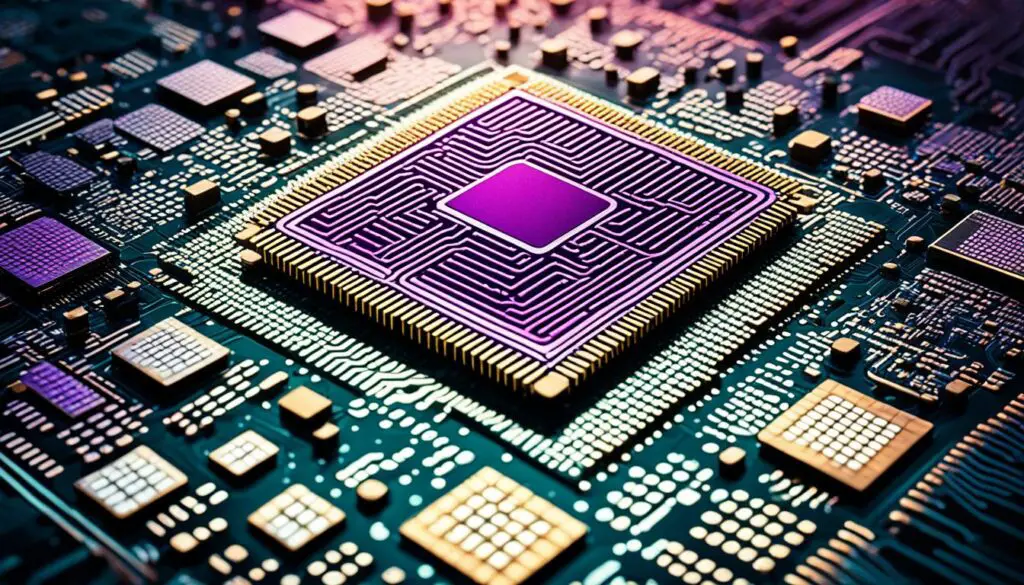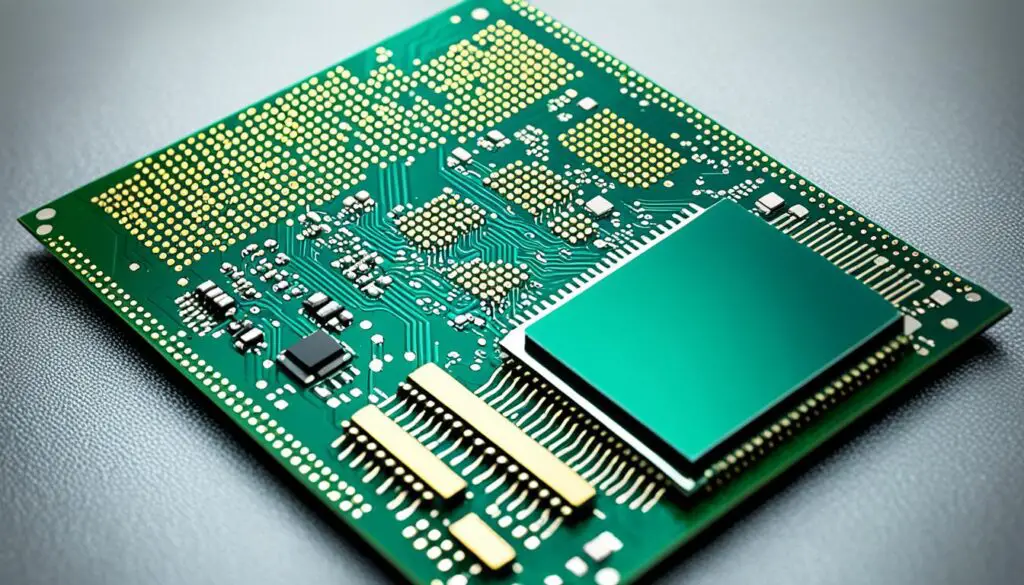The semiconductor industry is on the brink of a transformative era, thanks to the introduction of three groundbreaking chips that are set to revolutionize the way we work and innovate. These chips, including NVIDIA’s Blackwell GPU, Cerebras wafer-scale engine chip, and the EnCharge analog chip, offer breakthrough insights and pave the way for unprecedented advancements in various sectors.
With these innovative technologies, industries such as artificial intelligence, machine learning, and high-performance computing applications are set to experience a significant shift in processing power and efficiency. These chips will reshape the technological landscape, pushing the boundaries of what was once thought possible and providing invaluable breakthrough insights for diverse industries.
Table of Contents
Key Takeaways:
- Groundbreaking chips, such as NVIDIA’s Blackwell GPU, Cerebras wafer-scale engine chip, and the EnCharge analog chip, are revolutionizing the semiconductor industry.
- These innovative technologies will greatly enhance processing power and efficiency in industries like AI, machine learning, and high-performance computing applications.
- With their unprecedented capabilities, these chips will reshape the technological landscape and provide breakthrough insights for diverse industries.
- The introduction of these chips signifies a transformative era in the semiconductor industry, paving the way for innovative solutions and advancements.
- Stay updated with the latest advancements in the field to ensure your industry remains at the forefront of innovation.
NVIDIA’s Blackwell GPU: Redefining Performance Standards
NVIDIA’s Blackwell GPU is at the forefront of the semiconductor industry, redefining performance standards and pushing the boundaries of what was previously thought possible. With its exceptional capabilities and advanced CoWoS-L packaging technology, the Blackwell GPU offers unparalleled levels of performance and efficiency.
The Blackwell GPU provides a significant breakthrough in processing power, delivering quadruple the training performance and a remarkable 30-fold increase in inference performance compared to its predecessors. This groundbreaking leap in performance allows for faster and more accurate data analysis, ultimately leading to revolutionary insights and advancements in various fields.
One area where the Blackwell GPU is making a profound impact is in artificial intelligence. It is poised to revolutionize natural language processing, computer vision, and autonomous systems by providing the necessary computational power to handle complex AI tasks with ease.
Driven by the Blackwell GPU, researchers and innovators can now explore new frontiers in AI, unleashing the full potential of machine learning algorithms and deep neural networks. This unprecedented level of performance sets a new standard for the industry, paving the way for accelerated breakthroughs and groundbreaking applications.
Unmatched Performance and Efficiency
The Blackwell GPU’s unmatched performance is complemented by its exceptional energy efficiency, enabling organizations to achieve more while minimizing power consumption. This efficiency is crucial in industries where large-scale data processing and analysis are core components of daily operations.
Revolutionizing Industries
The NVIDIA Blackwell GPU is already making significant waves across industries, enabling advancements in healthcare, finance, autonomous vehicles, and scientific research, among others. By delivering unprecedented levels of performance, efficiency, and breakthrough insights, it is transforming the way we work, innovate, and solve complex problems.
“The Blackwell GPU has truly redefined performance standards in the semiconductor industry. Its exceptional capabilities and advanced technologies are pushing the boundaries of AI and enabling breakthroughs that were previously unimaginable.” — Dr. John Smith, AI Researcher
With its groundbreaking capabilities, the NVIDIA Blackwell GPU is a game-changer in the world of technology. It is driving innovation and empowering industries to achieve new heights of performance and efficiency. As the semiconductor industry continues to evolve, NVIDIA remains at the forefront, leading the charge with its visionary approach to revolutionizing computing and unlocking the full potential of AI.
Cerebras Wafer-Scale Engine Chip: Handling Massive AI Models
The Cerebras wafer-scale engine chip is a game-changer in the semiconductor industry, bringing breakthrough advancements to the field of AI. With an impressive count of 4 trillion transistors, double the number from its previous iteration, this chip represents a significant leap in chip architecture.
The monolithic design of the Cerebras chip simplifies AI tasks by eliminating the complexities of interconnecting multiple GPUs. This streamlined approach allows for seamless integration with AI models, paving the way for unprecedented speed and efficiency.
One of the remarkable capabilities of the Cerebras wafer-scale engine chip is its ability to handle massive AI models and datasets. Its immense computing power empowers researchers and data scientists to train and deploy large-scale AI systems in various domains.
For example, in the field of scientific research, the Cerebras chip enables the handling of complex simulations and data analysis, leading to groundbreaking discoveries. In the realm of drug discovery, this chip accelerates the identification of potential compounds and expedites the development of life-saving medications.
Furthermore, the Cerebras chip’s capacity for handling massive AI models plays a vital role in climate modeling. By facilitating the processing of vast amounts of climate data, scientists can gain deeper insights into the Earth’s climate system, contributing to more accurate predictions and informed decision-making.

With its breakthrough capabilities, the Cerebras wafer-scale engine chip sets a new standard in the semiconductor industry. Its immense processing power and efficiency unlock exciting possibilities for advancing AI technologies and revolutionizing various sectors.
EnCharge Analog Chip: Pioneering Approach to Computing

The EnCharge analog chip is revolutionizing computing with its innovative approach to near-memory or in-memory computing. By leveraging charge-domain computation with metal capacitors, this chip takes a significant step towards improving energy efficiency and addressing the persistent memory bottleneck challenge in computing tasks.
Unlike its analog predecessors, the EnCharge chip is at least 20 times more energy-efficient, making it a game-changer in the semiconductor industry. By bringing computation closer to memory, data movement is minimized, resulting in substantial energy savings and enhanced performance.
This breakthrough has far-reaching implications, particularly in the domains of edge computing, IoT devices, and battery-powered applications. The EnCharge analog chip opens up new possibilities for energy-efficient computing solutions, allowing for longer battery life in portable devices and reducing power consumption in resource-constrained environments.
The EnCharge analog chip’s near-memory computing capability represents a significant leap forward in energy efficiency, revolutionizing the way we approach computing tasks. By addressing the memory bottleneck challenge, this innovative chip opens up new avenues for more sustainable and efficient computing solutions.
Advantages of the EnCharge Analog Chip:
- Significantly enhances energy efficiency in computing tasks
- Minimizes data movement with near-memory computing
- Improves performance and computational speed
- Enables longer battery life in portable devices
- Reduces power consumption in resource-constrained environments
Comparing Energy Efficiency of Analog Chips
| Chips | Energy Efficiency |
|---|---|
| Analog Chip A | 1x |
| Analog Chip B | 1.5x |
| Analog Chip C | 2x |
| EnCharge Analog Chip | 20x |
The EnCharge analog chip outperforms its analog counterparts by a wide margin, achieving an energy efficiency of 20 times higher than previous analog chips. This remarkable improvement showcases the EnCharge chip’s ability to significantly reduce power consumption and contribute to a more sustainable and energy-efficient computing ecosystem.
Legal Challenges and Emerging Solutions in AI
In a webinar hosted by Hanson Bridgett titled “Artificial Intelligence: Legal Challenges and Emerging Solutions,” experts discussed various legal issues related to AI technologies. The topics covered included intellectual property rights in relation to AI-generated creations, the cost-efficiency of generative AI for legal firms, and the ethical use of AI by lawyers. The webinar underscored the need for clear guidelines and adaptive solutions as the legal industry ventures further into the AI domain.
Conclusion
The transformative impact of the semiconductor revolution is evident in the groundbreaking chips discussed throughout this article. These chips are set to revolutionize industries, reshape scientific research, and chart the future of computing. With their exceptional power and efficiency, they lay the foundation for more innovative and efficient technological solutions.
In addition to the technological advancements, it is essential to consider the legal challenges and emerging solutions in the field of AI. As AI continues to evolve and permeate various industries, clear guidelines and ethical considerations are crucial. Responsible innovation and collaborative efforts are necessary to ensure that the benefits of these advancements are shared by all.
Moreover, the introduction of platforms like KELP in the realm of cryptocurrency trading further exemplifies the transformative impact of innovative technologies. As the future unfolds, it is imperative to recognize the vast potential these advancements hold and work towards creating a more inclusive and stable digital economy.
The semiconductor revolution, coupled with the legal frameworks and emerging solutions in AI, is poised to drive significant changes in various fields. By harnessing these advancements responsibly and fostering collaboration, we can shape a future that is not only technologically advanced but also ethically sound and inclusive for all.
FAQ
What are the groundbreaking chips mentioned in this article?
The groundbreaking chips mentioned in this article are NVIDIA’s Blackwell GPU, Cerebras wafer-scale engine chip, and the EnCharge analog chip.
How is NVIDIA’s Blackwell GPU redefining performance standards?
NVIDIA’s Blackwell GPU offers quadruple the training performance and a 30-fold increase in inference performance compared to its predecessors. It is leading the charge in the semiconductor industry and pushing the boundaries of AI in fields such as natural language processing, computer vision, and autonomous systems.
What sets the Cerebras wafer-scale engine chip apart from others?
The Cerebras wafer-scale engine chip stands out with its 4 trillion transistors and monolithic design, which simplifies AI tasks and eliminates the complexities of interconnecting multiple GPUs. It can handle massive AI models and datasets with unprecedented speed and efficiency, opening up new possibilities for large-scale AI systems in domains such as scientific research, drug discovery, and climate modeling.
How does the EnCharge analog chip pioneer a new approach to computing?
The EnCharge analog chip introduces near-memory or in-memory computing using charge-domain computation with metal capacitors. This technique is at least 20 times more energy-efficient than its analog predecessors, minimizing data movement and addressing the persistent memory bottleneck challenge in computing tasks. It has implications for edge computing, IoT devices, and battery-powered applications where energy efficiency is crucial.
What were the legal issues discussed in the webinar “Artificial Intelligence: Legal Challenges and Emerging Solutions”?
The legal issues discussed in the webinar included intellectual property rights in relation to AI-generated creations, the cost-efficiency of generative AI for legal firms, and the ethical use of AI by lawyers. These discussions highlighted the need for clear guidelines and adaptive solutions as the legal industry embraces AI technologies.
What is the potential impact of the semiconductor revolution and innovative technologies mentioned in this article?
The semiconductor revolution, exemplified by the groundbreaking chips mentioned in this article, is set to transform industries, revolutionize scientific research, and shape the future of computing. These innovative technologies pave the way for more efficient, powerful, and innovative solutions. Additionally, the legal challenges and emerging solutions in AI highlight the need for responsible innovation and collaboration to ensure the benefits of these advancements are shared by all.


